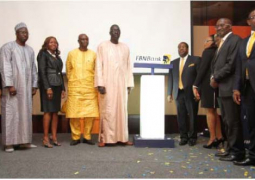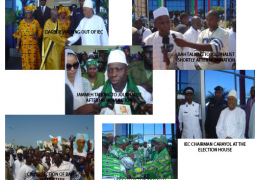
Dr Isatou Touray made this appeal on Thursday in Jarra Soma in the Lower River Region, whilst addressing a consultative meeting with district head chiefs to call for legislation to end FGM in The Gambia.
Traditional rulers, circumcisers, women councillors, parliamentarians in the region and governors of Lower River Region and Central River Region attended the meeting.
The GAMCOTRAP executive director noted that the time was ripe for the National Assembly members to pay heed to the clarion call made by communities and circumcisers, and to follow the good example of district chiefs of The Gambia to fulfill the state’s commitments made on behalf of district women and girls of The Gambia.
“Effective national legislation is a vital component of efforts to accelerate the elimination of FGM,” she said.
“The enactment and implementation of legislation against FGM demonstrates a formal, explicit and lasting commitment of the National Assembly and public authorities to protect girls from a practice that is detrimental to the physical, psychological and rights to bodily integrity and dignity of women and girls.”
According to her, the absence of legislation contributes to the perception of FGM as “acceptable” and weakens the legitimacy and impact of anti-FGM advocacy to protect children from HTP.
It also undermines the rhetorical commitments and pronouncements made by the state to promote and protect women’s rights, she said.
“Thus the NAMS as lawmakers should respect the commitments that the Government of The Gambia has made on behalf of women and children,” she said.
“The National Assembly members should reward women for giving them a place in parliament to become lawmakers. Therefore, any law passed in parliament is meant for the public good and not based on our personal and subjective opinions as lawmakers.”
Dr Touray described FGM as a violation of human rights principles as stipulated in article 24.3 of the Convention on the Rights of the Child, and the Convention on the Elimination of All Forms of Discrimination Against Women (CEDAW).
She said there are other International and Regional instruments such as the Protocol to the African Charter on Human and Peoples’ Rights on the Rights of Women in Africa (Article 5) and the African Union Solemn Declaration on Gender Equality in Africa, 2004.
She added that the constitution of The Gambia has guaranteed formal equality for women, and there are various policy documents that have relevant provisions and commitments to promote women’s rights.
Thus, the environment is positive for reform of laws or enactment of new laws to protect women and girl-children from Female Genital Mutilation that is inimical to their health, well-being and their human rights, she added.
“The Government of The Gambia as the primary duty bearer is a signatory to all the conventions and protocols to protect girls from FGM, and has committed itself to ban the practice,” Dr Touray stated. “The government has thereby committed itself to fulfill its obligations to see to it that the poor and innocent girl-child is protected from FGM and early marriage, thus leading to substantive equality.”
According to Dr Touray, communities have demonstrated that they have the information and knowledge on the effects of FGM on women and girls, thus “the four dropping of knives held in The Gambia between 2007 and 2013.”
She noted that 128 circumcisers and 900 communities have publicly demonstrated their willingness to protect girls and end FGM.
“We are still counting on more communities from different regions in the efforts to end FGM in The Gambia,” she said.
She praised the district chiefs of The Gambia, saying they have taken responsibility and leadership to protect their cluster communities from HTPs such as FGM and early marriage in conjunction with efforts and contribution made over the last 30 years, creating awareness and raising the consciousness of the custodians of the practices about the effects it has on women’s health and well being.
The chief of Jarra West, Yaya Jarjusey, who is a board member of GAMCOTRAP, said the dialogue on the call to ban FGM was intended to reach all those practising it with clear information on the effects it has on those subjected to the practice.
According to him, since the President of the country is concerned about the plight of girls and women, the advocates should be optimistic that legislation would surely be enacted to ban the practice.
“It is possible that there are some National Assembly members who are not in support of such legislation, but that should not mean the end of the campaign to criminalise FGM in the country,” he said.
He noted that the campaign against FGM has passed through serious hurdles and has registered milestones, while making great positive impacts on the population.
He recalled days when it was a difficult task to get a small number of audience to a meeting of such sensitive topic.
The Governor of Lower River Region, Salieu Puye, pointed out that the meeting should be patient with the National Assembly on their call for legislation to end FGM.
Governor Puye noted that because health is among the first priorities of the Government of The Gambia, enactment of any law to eliminate any harmful traditional practice may slowly but surely be achieved.
He commented on FGM is an old tradition, which should not be classified as a religious obligation.
Based on its deep-rooted life, he said, FGM is not expected to be chased away very soon.
He
enjoined the campaigners to jointly put up a comprehensive review of the
meeting agenda, which should be able to add more weight in persuading the
National Assembly to act accordingly.



